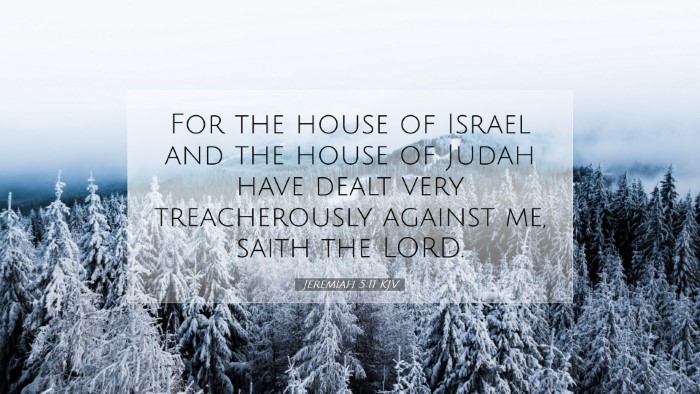Commentary on Jeremiah 5:11
Jeremiah 5:11 states:
"For the house of Israel and the house of Judah have dealt very treacherously against me, saith the Lord."
Introduction
This verse epitomizes the profound betrayal experienced by God in the relationship between Him and His people, Israel and Judah. As we delve into this Scripture, insights from renowned public domain commentators such as Matthew Henry, Albert Barnes, and Adam Clarke will be synthesized to elucidate the theological and historical significance of this passage.
Exegesis and Analysis
Jeremiah 5:11 is a pivotal point in the book of Jeremiah, illustrating the pervasive spiritual infidelity among the Israelites. Notably, the use of the term "treacherously" underscores the severity of their actions against God.
1. Contextual Background
In the context of Jeremiah’s prophetic ministry, the nation was steeped in idolatry and sin, turning away from the covenant established with God. Matthew Henry notes that this treachery reflects a deliberate forsaking of divine commandments, showing a conscious choice to engage in sin.
2. Theological Implications
This verse discloses the broken covenant relationship, emphasizing God's expectations and the reality of human disobedience. Barnes observes that both houses—Israel and Judah—are implicated, suggesting a national crisis where leaders and people equally share the blame. This speaks to the corporate nature of sin, reinforcing the necessity for collective repentance.
3. The Character of God
God’s character as a faithful covenant keeper is brought into sharp relief against the backdrop of human treachery. Adam Clarke emphasizes that while God remains faithful, the people’s unfaithfulness highlights a devastating cause-and-effect relationship between divine justice and human sinfulness.
Insights from Commentators
Matthew Henry
Henry remarks that the treachery committed by the Israelites is twofold: it encompasses both idolatry—worshipping false gods—and ethical wrongdoing. He asserts that this verse is crucial in understanding the severity of their sins and the consequent call for divine judgment.
Albert Barnes
Barnes elaborates on the dire state of affairs, noting that their "dealing treacherously" signifies a breach in trust with God. This broken trust serves as a call to recognize the existential dangers that arise from forsaking God’s statutes. He implores readers to understand the consequences of living outside of God’s sovereign will.
Adam Clarke
Clarke provides an understanding of the sociopolitical dynamics at play, emphasizing that the people's disloyalty not only alienated them from God but also weakened their societal structures. He challenges the notion that religious disobedience is merely a private affair, noting that such sins reverberate throughout the community and even to the nations surrounding them.
Application for Today
In reflection, this verse serves as a solemn warning and a clarion call for self-examination within the church today. The church, as the contemporary body of Christ, can take heed from Jeremiah's words. Just as Israel and Judah faced the consequences of their actions, so too must modern believers be vigilant against spiritual treachery.
- Self-Examination: Pastors and church leaders are encouraged to conduct thorough assessments of their congregations, ensuring that members do not become complacent in their faith.
- Call to Repentance: Recognizing our collective sins allows for a communal return to God, fostering unity and spiritual renewal.
- Education on Idolatry: Teaching against modern forms of idolatry, which can manifest as materialism, is crucial in overcoming the lens through which believers view their relationship with God.
Conclusion
Jeremiah 5:11 is not merely an indictment against Israel and Judah; it serves as a timeless reminder of the dangers of spiritual betrayal. As seen through the lens of Matthew Henry, Albert Barnes, and Adam Clarke, this verse invites pastors, theologians, and students of the Word to engage deeply with the text, fostering a community of faith that remains steadfast in loyalty to God.


